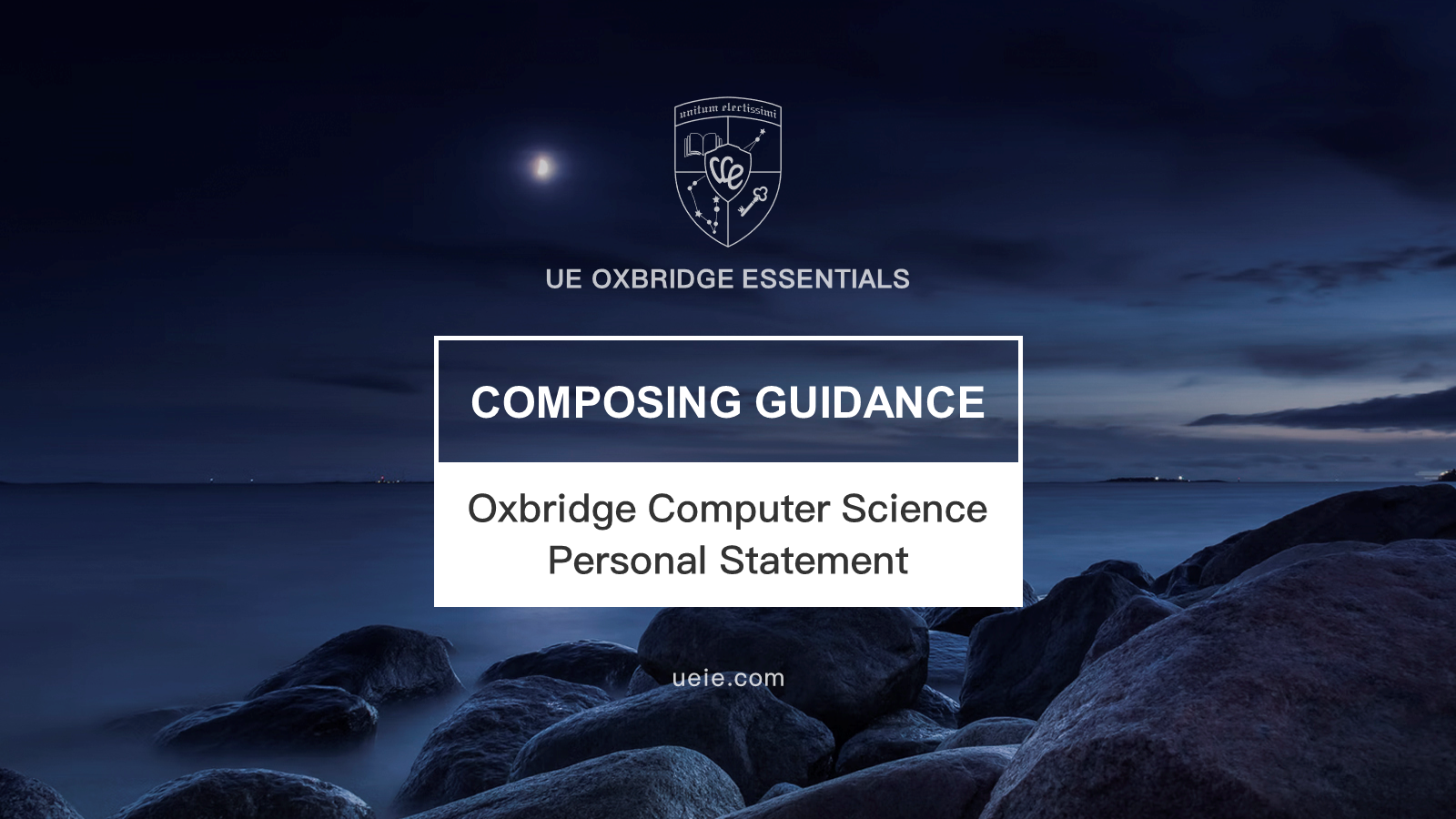The application process to one of the prestigious universities at Oxford or Cambridge (usually known as Oxbridge) can be very challenging and rewarding. A computer science personal statement is essential to Oxbridge’s application, especially for highly competitive courses. We will give potential Computer Science applicants suggestions on crafting an impressive personal statement alongside a sample essay and feedback for reference.
I. What is a Personal Statement?
In a computer science personal statement, you describe your motives for studying a course, highlight your educational achievements, demonstrate your passion for the course, and prove your ability to think seriously and communicate effectively.
A computer science personal statement is a part of the college application and is especially important for Oxbridge applicants to include one. In addition to excellent academic credentials, admissions tutors are looking for applicants who can demonstrate genuine enthusiasm for their examination and the capability to contribute to it.
And it should be noted that UCAS released the FUTURE OF UNDERGRADUATE ADMISSIONS in January 2023, indicating that it will reform five aspects of the undergraduate admissions process. UCAS will be reframing the current format of the personal statement into a series of questions:
- Motivation for course – Why do you want to study these courses?
- Preparedness for course – How has your learning so far helped you to be ready to succeed on these courses?
- Preparation through other experiences – What else have you done to help you prepare, and why are these experiences useful?
- Extenuating circumstances – Is there anything that the universities and colleges need to know about, to help them put your achievements and experiences so far into context?
- Preparedness for study – What have you done to prepare yourself for student life?
- Preferred learning styles – Which learning and assessment styles best suit you – how do your courses choices match that?
However, at present, a personal statement is still required for students applying in the 2024 application cycle.
II. What to Prepare Before Writing a Computer Science Personal Statement
There are numerous considerations to make before setting pen to paper:
- Reflect on your passion for Computer Science: Consider why you are passionate about Computer Science and what excites you about this field. Are there any particular areas of Computer Science you are eager to explore?
- Understand the course structure: Familiarize yourself with the course structure. Look at the modules and subjects that appeal to you most. Explore the official websites of Oxford and Cambridge for detailed information on computer science course.
- Highlight relevant experience: Whether through projects, competitions, internships, or self-led learning, highlight any experience that displays your dedication to learning Computer Science.
- Academic achievements: Describe any excellent academic achievements, such as grades, awards, or recognitions, that illustrate your suitability for the career.
1. Questions to Ask Yourself
- I am passionate about computer science, but what was the spark that ignited my interest?
- Can I pursue this hobby both academically and recreationally?
- What challenges have I overcome in my quest for expertise in this field?
What are my long-term goals, and how will studying at Oxbridge help me achieve them?
The computer science personal statement is your virtual footprint to computer science courses in Oxbridge. It indicates your passion, dedication, and readiness to delve into the complexities of computing and its effects on society.
III. Laying the Foundation
1. Understanding what Oxbridge seeks
In addition to programming skills, Oxbridge seeks college students who are deeply interested in the theoretical foundations of computer technology and its broader implications. Your statement should reflect technical skills, conceptual understanding, and an interest in future technologies.
2. The role of your statement
A computer science personal statement is a story that ties together students’ aspirations beyond their studies with their future goals. Using this platform, you can demonstrate how your hobby in computer science aligns with Oxbridge’s ethos of pioneering studies and innovation.
3. Your personal skills and achievements
The next thing you need to do is describe your capabilities and achievements. Universities want to recognize your abilities that will help you in the course or your university career in general.
4. Ensure you include evidence to support your enthusiasm for the chosen course
Describe the accomplishments you’re proud of and be ambitious. Include all positions of responsibility and your work experience.
It is essential to include information about jobs, placements, painting interests, or voluntary work, specifically if it is relevant to your course. If you enjoy anything, connect it to a competency or characteristic that will help you succeed. Give an explanation of how you propose to use the expertise and enjoyment you will benefit to launch your career if you know what you’d love to do afterwards.
IV. Structuring Your Narrative
1. Capturing the Essence
- Engaging Opening: A vivid assertion or story should demonstrate your fascination with computer science. Make it memorable, whether it’s a recollection of your first computer, a problem you solved through programming or an idea from a tech innovator.
2. The Core of Your Story
- Academic Journey: Discuss your educational journey in computer technology, precisely any specific initiatives, coursework, or accomplishments that have prepared you for college.
- Practical Experiences: Share your practical encounters with programming languages, software program development, internships, or any real-world application of your computer expertise.
- Extracurricular Activities: Discuss extracurricular activities that demonstrate your passion for PC technology outside the classroom, such as clubs, competitions, hackathons, or private initiatives. You can contribute by developing apps, participating in coding forums, or contributing open-source software.
- Intellectual Curiosity: Reflect on books, articles, podcasts, or lectures that have advanced your understanding of computer technology, particularly those that have challenged your view of the era and its role in society.
- Problem-Solving Skills: Describe how you have used logical and innovative questioning techniques to resolve complex problems, whether in instructional initiatives, coding challenges, or regular situations.
3. Envisioning the Future
- Future Goals: Explain how studying computer science at Oxbridge will assist you in attaining your long-term career ambitions, whether academic, industrial, or entrepreneurial.
- Personal Growth: Describe how your engagement with computer science has shaped your personal development, learning method, and aspirations to contribute to the field.
4. End of Your Essay
An excellent way to enhance what you said at the beginning is to tie the start of your declaration to the end.
The finishing line is your chance to make an admissions tutor remember you by completing well. As the last part of your computer science personal statement, you should emphasize the high-quality points you’ve already made and explain why you deserve a place.
V. Refining Your Statement
- Clarity and Precision: Ensure your assertion is well-prepared and your thoughts are conveyed. Jargon should be avoided unless necessary to illustrate a point, and complicated standards should be explained in everyday language.
- Authentic Voice: Writing with an authentic voice reflects who you are. In addition to your attitude and private interest in computer science, Oxbridge admissions tutors are interested in what you say about it.
- Feedback and Revisions: Ask teachers, mentors, and friends familiar with the Oxbridge computer science course for feedback and revision. Be open to suggestions and willing to revise your computer science personal statement several times to improve it.
Create a computer science personal statement that resonates with clarity, purpose, and vision by embracing your passion for generation and innovation.
Want to learn more about the guidance and detailed suggestions for your computer science personal statement? Explore the official website of UCAS and get everything you need to know.

VI. Sample Computer Sciences Personal Statement and Comments
1. Computer science personal statement sample
The layman looks at a graphical interface to interact with their computers and never stops to question the development behind it. When I found out that the fundamentals of computing were written in binary base 2 number system composed by simple 0s and 1s, I was astonished and began to understand more and my curiosity in mathematics began to broaden. Building my first few programs using C++ gave me a glimpse into the possibilities of programming and how effective they are at making processes more productive and efficient. Using Visual Basic, I created an E-bay fee calculator and a basic calculator. From building these programs I found that at the element of programming, true understanding, mathematics is fundamental. During that period, I realised that if I wanted to learn more I needed to dedicate my time to computing and mathematics which is what motivated me to apply for Computer Science.
My interest in computers has led me to attend lectures and open days held at UCL and Imperial College London including “What is Quantum Computing?” By realising some indecipherable problems as well as prospects for the future, my desire to bring that future into the present increased. For a long time, computing has been set according to Moore’s Law; the number of transistors doubles every two years. I am enlivened to see that a destined alternative path may slow down or even stop that pace for a number of years. While studying mathematics I was able to develop a logical thought process that I applied to ICT and biology. I have been able to interlink these subjects to gain invaluable analytical skills. Also, through independent studies I have been able to learn a substantial amount on networking basics. These skills combined allowed me to apply what I have learnt in my own home.
One of my more recent projects of them has been running a NAS and virtual Windows on the same machine using UnRaid. Thus not only giving full performance in Windows, using Cinebench as my benchmark, but also allowing full access to network storage at any time. I was fortunate enough to go on a school trip to CERN in Geneva and I was able to grasp how vital computing is to interpret data, through logical computation and statistics. The terabytes of data that is collected needs to be processed and stored, this requires high levels of networking skills to be able to set up. In July of 2015 I was able to secure a work experience placement in the Product Design and Development department at Sky where I was given responsibility for setting up Sky Box racks used in automatic testing. This allowed me to understand how computing is used in a working environment and how they have implemented an ADGILE work flow which allows them to work better as a team and contribute to making a better product. What struck me the most was the emphasis on direct communication between colleagues, every morning a staff meeting was expected where progress was discussed. I appreciated the amount of time and patience it takes to develop award winning software for hardware that is more than 5 years old; the same patience skills I gained from my own projects. In my free time, cooking and baking creative desserts for the family has always been a favourite. It allows me to explore my creative side as well as allowing me to further improve my problem solving skills when something goes wrong.
In addition, I play basketball regularly with friends where I find this an excellent stress release. Throughout the past two years I have seen how computing and mathematics play an important role in our everyday life and within a decade alone it has revolutionised not only the computing industry but the way we learn altogether. I will not only be equipped with the skills necessary for a successful career in Computer Science, but also be surrounded by people who share the same interest as myself if I study Computer Science.
2. Comments
This pattern effectively communicates the applicant’s connection to computer science, educational proficiency, and relevant extracurricular experiences. Oxbridge’s values of excellence and innovation are demonstrated in this essay by the self-driven pursuit of the problem and the clean aspirations it describes.
VII. Conclusion
In conclusion, crafting your computer science personal statement for Oxbridge requires introspection, readability of purpose, and a credible voice. Be sure to emphasize those elements of your persona and achievements that immediately relate to computer science and reflect your motivation to study at Oxbridge.
A thoughtful approach and diligent guidance can make your statement a compelling testament to your potential, allowing you to stand out among highly qualified candidates. Best of luck!



